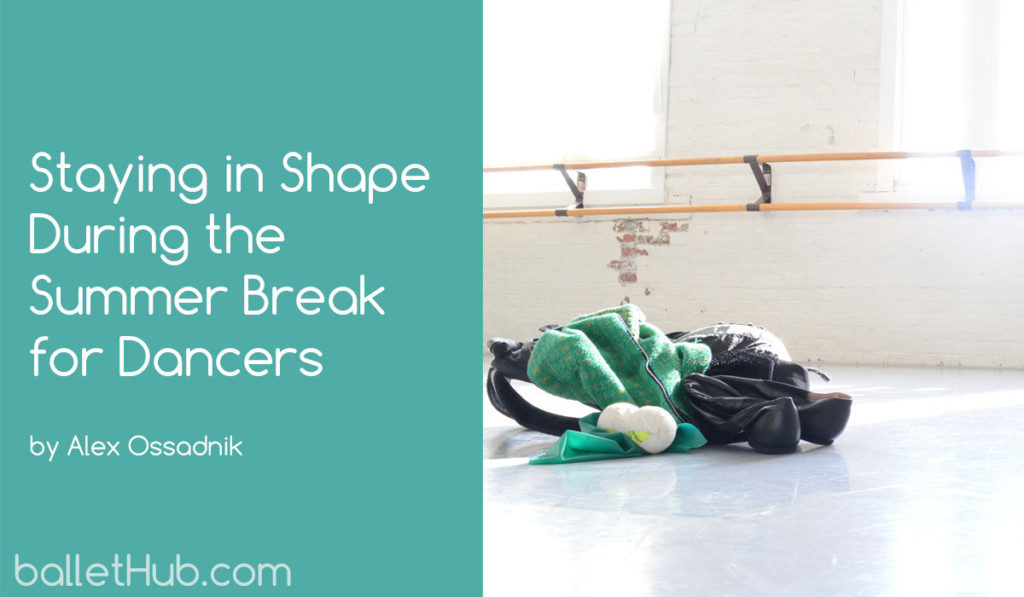Especially during the summer month, staying in shape can become an issue when there are less classes to take. It can be scary or comforting, depending on which end of the spectrum you are. At Ballet Idaho, our dancers are faced with a brutal layoff between mid April and October, making a living takes often precedence over training. However, once the new season starts, they are back in action and onstage after less than four weeks.
The task of staying in shape can teach you many things about yourself, your body, your dreams and aspirations.
Depending on your situation, off time can be bridged with summer intensives, but failing that, there are things to be aware of and things you should know if you are concerned about your body and your physical shape. Before I spill the beans about it, I do want to address one very important thing: Regardless of your seriousness about becoming a professional dancer or dancing just for fun, you can only be a complete human being and artist if you allow yourself to experience life at its fullest.
… make sure to stretch [your muscles] afterward or at least every other day.
A long break provides you with the opportunity to catch up on everything that was on the back burner during the busy time of the year: Family, friends, love (if you are old enough), pets, books, movies, travel, nature, and just being a regular person. It is very easy to get into the ballet bubble and forget the world outside, but what makes you “you”, what gives you the ability to express yourself on stage, what takes your performance to the next level and makes you relate to an audience, all of that comes from your life experience.
Steps are only steps unless between the lines there is a deeper meaning that can speak to anyone, balletomane or pedestrian, making these steps into words, sentences, poems and stories. Time off is time to be used to live and to become a better human being.
Now, here are some “does” and “don’t’s” to stay in shape:
- The human body is engineered to adapt, muscles grow or atrophy depending on the signals and commands you give them. Take the stairs instead of escalators or elevators, if and when you have the choice, go for your sneakers instead of the car. Hiking, biking, swimming, walking are all great things to stay active, just be aware that they favor muscles in your body that you don’t want to over develop.
- To keep a healthy balance between “turn in muscles” (muscles you use outside of your ballet training) and “turn out muscles”, make sure to stretch them afterward or at least every other day. There is no need for a studio to give yourself some plies, tendues and releves occasionally. Most bedrooms are large enough to accommodate a moderate routine and trust me, tendues can feel great barefoot on some nice carpet. I used to practice balances while washing dishes, if you want to try it, please start with things that can’t break or shatter.
- Your situation permitting, a gym can be a great place to take care of your body. If you are intimidated by that thought or worried to make a fool of yourself, be assured that people in a gym are only concerned with themselves and don’t have the time to look at others or make fun of them. I have never had a reason to feel embarrassed in the last twenty years of working out almost daily. Most gyms have the equipment to train every single muscle group in your body and also have the staff to help you learn how to use it safely. Especially for maintaining your inner thighs, hip abduction exercises are very helpful. Don’t get crazy though on the resistance level, a good rule of thumb is, if you can put in ten to twelve repetitions, three times (sets) with a one minute break between, the weight is appropriate for your body.
- Low resistance (weight) and high repetitions (the number of times you do a certain thing in a row) will tone and strengthen your muscles. High resistance and low repetitions will make your muscles grow. Make sure to work out evenly, if for example, you work the front of your arm (bicep), make sure to work the back of your arm (tricep) as well. If you work your abdominals, make sure to follow it with some lower back exercises. Cardio is important too, you’ll find plenty of choices from treadmills to bikes, stair masters and more. But be intelligent! Let your body tell you when it is enough, you are not training for the Olympics.
If you are concerned about your weight, here are some pointers that are good advice anytime: *
Food is energy. Energy that is not used will be stored by your body. Stored energy is fat. Here is a very simple nutritional equation:
- To maintain your body as is, use all the energy that you put inside you through food.
- To loose weight, use more energy than you put inside you through food.
- To gain weight, use less energy than you put inside you through food.
There is nothing wrong with cravings, sweets, etc., as long as you are aware of this equation. Also know that beverages are considered food. If you make your own food choices, and you want to eat healthy, avoid anything that originates from a box, a bag or any other container. The prettier the package, the more it is to be avoided.
Most gyms have the equipment to train every single muscle group in your body and also have the staff to help you learn how to use it safely.
Good food is an ingredient to be prepared, not something that has been already processed. Some exceptions are spices, herbs, canned tomatoes and canned tuna, pasta and rice. Frozen ingredients are fine as well. Cook your own meal, if you can. Learn how to cook if you have to.
Cooking is a basic survival skill and puts you in charge of energy intake and output. It is also much cheaper than buying already prepared foods. Water is cheaper than soda. Unless you have a problem with meats, the best meal plan I can think of is a different kind of meat or fish every other day and a vegetarian meal in between.
The task of staying in shape can teach you many things about yourself, your body, your dreams and aspirations. It also takes your mind off your dancing and allows your body to process subconsciously all the information it received during the year. It is good to take a break at times, step away, reflect and figure things out. There is no law that prohibits being just a normal kid sometimes, regardless of your age.
* Nutrition Disclaimer: BalletHub, its affiliated and guest writers, are not certified nutritionists and make no claims to the contrary. Each individual’s dietary needs and restrictions are unique to the individual. This website contains articles written and produced for informational purposes only. YOU are ultimately responsible for all decisions pertaining to your health. Statements within this site have not been evaluated or approved by the Food and Drug Administration. This website is not intended to diagnose, treat, cure or prevent any disease. Content should not be considered a substitute for professional medical expertise or treatment. The reader assumes full responsibility for consulting a qualified health professional regarding health conditions or concerns, and before starting a new diet or health program. BalletHub, LLC, and the writer(s) and publisher(s) of this site are not responsible for adverse reactions, effects, or consequences resulting from the use of any recipes or suggestions herein or procedures undertaken hereafter.

